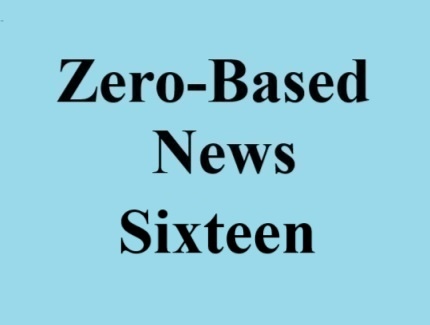Peirspictiochtai Ar An Saol
Zero-Based News
Part Sixteen

Media organizations have different policies on the use of anonymous sources.
For some media organizations, the use of anonymous sources is not allowed at all. All interviews with sources are done "on the record." This means that an individual being interviewed is giving permission to be quoted by name and other information (title, location, and other related items) in the news coverage presented by a media organization. All sources for news presented by these media organizations are identified. For example, the media organizations would state that "John Smith of the Acme Brick Company in Newtown said…"
Many media organizations allow the use of anonymous sources in their news coverage. Some severely limit the use of anonymous sources, while others have a more expansive view when using anonymous sources.
Among media organizations that allow limited uses of anonymous sources, that use may be allowed in situations where abuse as well as life and death issues are involved. For example, an individual who was beaten by their spouse may be quoted without identifying the individual by name or other information. Instead, the individual may be identified by a fictitious first name and no surname with an explanation of why the individual is not being directly identified.
Some media organizations don't identify individuals who are victims of certain crimes, but may quote them, stating that the individuals are victims of those specific crimes. Other media organizations don't identify individuals that are accused of criminal acts unless and until the individuals are formally charged with criminal acts, but may quote them, stating that the individuals have been accused of criminal acts, but have not been charged with any crimes. In cases where the victims of certain crimes are related to the people formally charged with committing those crimes, some news media organizations don't identify any of the individuals to avoid identifying the victims of certain crimes.
Among the media organizations that have a more expansive view when using anonymous sources, many use specific terms to describe how information was provided by anonymous sources: "on background," "on deep background," and "off the record."
Sources that provide information "on background" include individuals who want to remain anonymous by specific name, title, and related items, but are willing to be identified in a general manner. For example, instead of stating that "John Smith of the Acme Brick Company in Newtown said…," the media organizations would state that "A local business leader in Newtown said…"
Sources that provide information "on deep background" include individuals who want to remain anonymous by specific name, title, and related items and are also not willing to be identified in a general manner. For example, instead of stating that "John Smith of the Acme Brick Company in Newtown said…" or that "A local business leader in Newtown said…," the media organizations would themselves become the sources of the information by using wording like "We have learned…"
Sources that provide information "off the record" include individuals who want to provide information, but do not want that information used at all in the news coverage by media organizations. Not only do the individuals not want the information used, but the individuals also want to remain completely anonymous; they don't want to be identified by specific name, title, and related items and are also not willing to be identified in a general manner.
The information provided "off the record" by sources may include information that is confidential, security-related, or information owned by someone who has not given permission to release that information.
You might wonder why individuals would provide information "off the record" if they don't want the information used by the media organizations.
These individuals may actually want the information used by media organizations, but they don't want to be personally associated with the release of the information.
In many cases, media organizations that gather information "off the record" from sources use that information to find other sources who would be willing to provide the same or similar information "on the record," "on background," or "on deep background."
In other words, "off the record" information can serve as the foundation for a puzzle that may be created from scratch by a media organization. With that base knowledge as pieces of a puzzle, a media organization can then add additional pieces to a puzzle that eventually becomes part of their news coverage.
The next news column in this series will focus on how self-censorship impacts the reporting of news.
Peirspictiochtai Ar A Saol – Gaelic – Irish – for "Perspectives On Life" is a column focused on aspects of accountability and responsibility as well as ways people look at life.
Contact Richard McDonough at
© 2025 Richard McDonough










